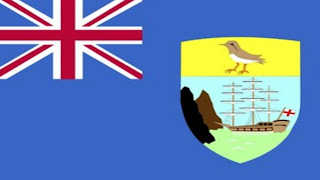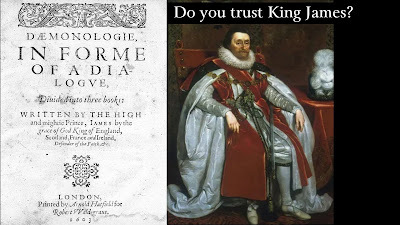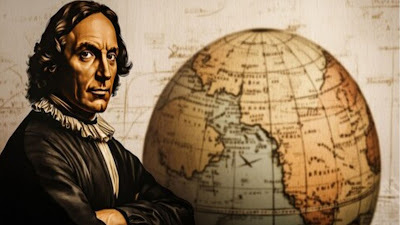Trey'von Knowles's Blog, page 30
December 20, 2024
British Missionaries in Colonial Africa 1700's
The story of missionary work in colonial Africa begins with The Age of Discovery. This is a period where European powers set their sights on exploring the world. This was the start of a global economy and colonialism. The British colonized many nations including Nigeria to exploit native labor and natural resources beginning in the 1700’s (Reviews). Their justification for colonization was that they were providing better education and healthcare to the natives (Nigeria – Influence).
Another primary justification for colonization was missionary work. Today, Christianity is criticized in the context of Colonialism because it was used to justify Colonialism. The British, along with many other European empires, pillaged these countries of resources, engaged in human trafficking of the native people, and exploited their labor in the collection of these resources.

Missionaries attempted to convert as many native people as possible to Christianity. This effect of this work is still apparent today where nearly half of Nigerians are Christian (Nigeria – United). Different denominations of Christianity divided the Nation into their own spheres of influence in order not to compete with each other. Among the Igbo, Catholic missionaries were particularly present. In fact, the British were successful in largely eliminating common practices in Nigeria of human sacrifice and the killing of infant children.
The missionaries felt that spreading the gospel to these people was of great importance, and actively tried to erase their beliefs in Polytheism. British missionaries even promoted the Natives into leadership positions within the church. In fact, the British missionaries were successful in largely eliminating common practices in Nigeria of human sacrifice and the killing of infant children.
The Christian missionaries of the Colonial Age worked in very different ways from the missionaries of today. They believed that converting native people to Christianity was of such dire importance that they felt justified in forcibly and violently converting them. This did much damage not only to those directly impact by the hostility but to the generations of lost culture and tradition of native religions all across Africa.
The British Empire, colonialism, and missionary activity:
Christian missionary activity was central to the work of European colonialism, providing British missionaries and their supporters with a sense of justice and moral authority. Throughout the history of imperial expansion, missionary proselytizing offered the British public a model of civilized expansionism and colonial community management, transforming imperial projects into moral allegories.
Missionary activity was, however, unavoidably implicated in either covert or explicit cultural change. It sought to transform Indigenous communities into imperial archetypes of civility and modernity by remodeling the individual, the community, and the state through Western, Christian philosophies.
In the British Empire, and particularly in what is historically known as the ‘second’ era of British imperialism (approximately 1784–1867), missionary activity was frequently involved with the initial steps of imperial expansion. A heightened sense of religiosity in Britain at this time ensured that Christianization was seen as a crucial part of the colonizing and civilizing projects of the eighteenth and nineteenth centuries.
By the middle of the nineteenth century, under the double aegis of “the bible and the flag”, governments, merchants, explorers, and other adventurers were exploiting the aura of ethical responsibility lent by religion to every effort to carry British civilization to a benighted world.
Whilst earlier European empires (such as the Spanish and Portuguese) had spread Catholicism, Protestant churches had traditionally been too deeply divided to make any commitment to overseas missions.
Note: It is written in Matthew 16:24-25.
24 Then Jesus said to his disciples, “Whoever wants to be my disciple must deny themselves and take up their cross and follow me. 25 For whoever wants to save their life will lose it, but whoever loses their life for me will find it.
Note: In other words, if a man is not denying himself he is wicked how can he do missionary work without doing the missionary work on himself?
Note: It is written in Matthew 10:13-15.
13 If the home is deserving, let your peace rest on it; if it is not, let your peace return to you. 14 If anyone will not welcome you or listen to your words, leave that home or town and shake the dust off your feet. 15 Truly I tell you, it will be more bearable for Sodom and Gomorrah on the day of judgment than for that town.
Note: This is how you do Missionary work outside of this is wicked.
Follow The Spirt of the Lord
Since we live by the Spirit, let us keep in step with the Spirit.
Alignment with God's will:
Making decisions and taking actions that reflect God's values and teachings.
Fruit of the Spirit:
Demonstrating characteristics like love, joy, peace, patience, kindness, goodness, faithfulness, gentleness, and self-control as a result of being led by the Spirit.
Prayer and meditation:
Spending time in quiet reflection to seek God's guidance and discern the Spirit's leading.
Trusting in the process:
Believing that the Holy Spirit will guide you in the right direction, even when the path is unclear.

Ezekiel’s Inaugural Vision
Ezekiel’s Inaugural Vision
1 In my thirtieth year, in the fourth month on the fifth day, while I was among the exiles by the Kebar River, the heavens were opened and I saw visions of God.
2 On the fifth of the month—it was the fifth year of the exile of King Jehoiachin— 3 the word of the Lord came to Ezekiel the priest, the son of Buzi, by the Kebar River in the land of the Babylonians. There the hand of the Lord was on him.
4 I looked, and I saw a windstorm coming out of the north—an immense cloud with flashing lightning and surrounded by brilliant light. The center of the fire looked like glowing metal, 5 and in the fire was what looked like four living creatures. In appearance their form was human, 6 but each of them had four faces and four wings. 7 Their legs were straight; their feet were like those of a calf and gleamed like burnished bronze. 8 Under their wings on their four sides they had human hands. All four of them had faces and wings, 9 and the wings of one touched the wings of another. Each one went straight ahead; they did not turn as they moved.

10 Their faces looked like this: Each of the four had the face of a human being, and on the right side each had the face of a lion, and on the left the face of an ox; each also had the face of an eagle. 11 Such were their faces. They each had two wings spreading out upward, each wing touching that of the creature on either side; and each had two other wings covering its body. 12 Each one went straight ahead. Wherever the spirit would go, they would go, without turning as they went. 13 The appearance of the living creatures was like burning coals of fire or like torches. Fire moved back and forth among the creatures; it was bright, and lightning flashed out of it. 14 The creatures sped back and forth like flashes of lightning.
15 As I looked at the living creatures, I saw a wheel on the ground beside each creature with its four faces. 16 This was the appearance and structure of the wheels: They sparkled like topaz, and all four looked alike. Each appeared to be made like a wheel intersecting a wheel. 17 As they moved, they would go in any one of the four directions the creatures faced; the wheels did not change direction as the creatures went. 18 Their rims were high and awesome, and all four rims were full of eyes all around.
19 When the living creatures moved, the wheels beside them moved; and when the living creatures rose from the ground, the wheels also rose. 20 Wherever the spirit would go, they would go, and the wheels would rise along with them, because the spirit of the living creatures was in the wheels. 21 When the creatures moved, they also moved; when the creatures stood still, they also stood still; and when the creatures rose from the ground, the wheels rose along with them, because the spirit of the living creatures was in the wheels.
22 Spread out above the heads of the living creatures was what looked something like a vault, sparkling like crystal, and awesome. 23 Under the vault their wings were stretched out one toward the other, and each had two wings covering its body. 24 When the creatures moved, I heard the sound of their wings, like the roar of rushing waters, like the voice of the Almighty, like the tumult of an army. When they stood still, they lowered their wings.
25 Then there came a voice from above the vault over their heads as they stood with lowered wings. 26 Above the vault over their heads was what looked like a throne of lapis lazuli, and high above on the throne was a figure like that of a man. 27 I saw that from what appeared to be his waist up he looked like glowing metal, as if full of fire, and that from there down he looked like fire; and brilliant light surrounded him. 28 Like the appearance of a rainbow in the clouds on a rainy day, so was the radiance around him.
This was the appearance of the likeness of the glory of the Lord. When I saw it, I fell facedown, and I heard the voice of one speaking.
December 19, 2024
Can King James be Trusted?
Can King James be Trusted?
In 1597 King James 1 wrote a book called Demonology:
King James wrote a dissertation titled Daemonologie that was first sold in 1597, several years prior to the first publication of the King James Authorized Version of the Bible. Within three short books James wrote a philosophical dissertation in the form of a Socratic dialogue for the purpose of making arguments and comparisons between magic, sorcery and witchcraft, but wrote also his classification of demons.

In writing the book, King James was heavily influenced by his personal involvement in the North Berwick witch trials from 1590. Following the execution of an alleged sorcerer in the year 1591, the news of the trials was narrated in a news pamphlet titled Newes from Scotland and was included as the final chapter of the text. The book endorses the practice of witch hunting in a Christian society. King James may also have been prompted to write the Daemonologie by an anonymous critical pamphlet John Upaland which circulated in 1597 and alleged the Scottish court was bewitched.
James begins the book:
The feaefull aboundinge at this time in this countrie, of these detestable slaves of the Devil, the Witches or enchanters, hath moved me (beloved reader) to dispatch in post, this following treatise of mine (...) to resolve the doubting (...) both that such assaults of Satan are most certainly practised, and that the instrument thereof merits most severely to be punished.
As detailed in his preface, the main sources of this work were that of historically confessed witches, judicial case history and the Bible itself. He also amassed various dissertations on magical studies to expand his education on the relationships between infernal spirits and men. James generally sought to prove that the devilish arts have always been yet still are, but also explains the justification of a witch trial and the punishments which a practitioner of the dark arts merits.
He also reasons scholastically what kinds of things are possible in the performance of these arts, and the natural causes of the Devil's power with the use of philosophical reasoning. King James sought to prove the existence of witchcraft to other Christians through biblical teachings. His work is separated into three books based on the different arguments the philosophers discuss, with citations of biblical scripture throughout the text.
Did Fallen Angels Have Sex with Humans and Create a Race?
Did Fallen Angels Have Sex with Humans and Create a Race of Giants?
It is written in Genesis 6:4 The Nephilim were on the earth in those days—and also afterward—when the sons of God went to the daughters of humans and had children by them. They were the heroes of old, men of renown.

Who is the Race?
Where does knowledge of technology come from in one century?
What type of child of God makes weapons, guns, and destruction.
What type of child is that?
Note: A child of God does not do that type of behavior.
It is written in Galatians 5:22-23 states, "But the fruit of the Spirit is love, joy, peace, patience, kindness, goodness, faithfulness, gentleness, self-control. Against such things there is no law.https://crosssides.blogspot.com/Who Taught the Man to make Nuclear Weapons?
In the Book of Enoch, Azazel the falling angel is responsible for teaching people to make weapons and cosmetics, for which he was cast out of heaven.

Note: God does not teach anyone to do evil so it does not come from God.https://crosssides.blogspot.com/
Who Taught the European Man to make Nuclear Weapons?
In the Book of Enoch, Azazel the falling angel is responsible for teaching people to make weapons and cosmetics, for which he was cast out of heaven.

Note: God does not teach anyone to do evil so it does not come from God.https://crosssides.blogspot.com/
December 18, 2024
The Age of Discovery
The Age of Discovery (1418 – 1620), also known as the Age of Exploration, was part of the early modern period and largely overlapped with the Age of Sail. It was a period from approximately the late 15th century to the 17th century, during which seafarers from a number of European countries explored, colonized, and conquered regions across the globe.

The Age of Discovery was a transformative period in world history when previously isolated parts of the world became connected to form the world-system and laid the groundwork for globalization. The extensive overseas exploration, particularly the opening of maritime routes to the Indies and the European colonization of the Americas by the Spanish and Portuguese, later joined by the English, French and Dutch, spurred in the International global trade. The interconnected global economy of the 21st century has its origins in the expansion of trade networks during this era.
The exploration also created colonial empires and marked an increased adoption of colonialism as a government policy in several European states. As such, it is sometimes synonymous with the first wave of European colonization. The colonization reshaped power dynamics causing geopolitical shifts in Europe and creating new centers of power beyond Europe. Having set human history on the global common course, the legacy of the Age still shapes the world today.
European oceanic exploration started with the maritime expeditions of Portugal to the Canary Islands in 1336, and later with the Portuguese discoveries of the Atlantic archipelagos of Madeira and Azores, the coast of West Africa in 1434, and the establishment of the sea route to India in 1498 by Vasco da Gama, which initiated the Portuguese maritime and trade presence in Kerala and the Indian Ocean.
During the Age of Discovery, Spain sponsored and financed the transatlantic voyages of the Italian navigator Christopher Columbus, which from 1492 to 1504 marked the start of colonization in the Americas, and the expedition of the Portuguese explorer Ferdinand Magellan to open a route from the Atlantic Ocean to the Pacific, which later achieved the first circumnavigation of the globe between 1519 and 1522.
These Spanish expeditions significantly impacted the European perceptions of the world. These discoveries led to numerous naval expeditions across the Atlantic, Indian, and Pacific Oceans, and land expeditions in the Americas, Asia, Africa, and Australia that continued into the late 19th century, followed by the exploration of the polar regions in the 20th century.
European exploration initiated the Columbian exchange between the Old World (Europe, Asia, and Africa) and the New World (the Americas and Australia). This exchange involved the transfer of plants, animals, human populations (including slaves), communicable diseases, and culture across the Eastern and Western Hemispheres.
The Age of Discovery and European exploration involved mapping of the world, shaping a new worldview and facilitating contact with distant civilizations. The continents drawn by European mapmakers of the Age developed from abstract "blobs" into the outlines more recognizable to us today. Simultaneously, the spread of new diseases, especially affecting American Indians, led to rapid population declines.
The era saw widespread enslavement, exploitation and military conquest of native populations, concurrent with the growing economic influence and spread of western and European culture, science and technology leading to a faster-than-exponential population growth world-wide.
Age of Discovery the Catholic Church:
During the Age of Discovery, the Catholic Church inaugurated a major effort to spread Christianity in the New World and to convert the Native Americans and other indigenous people. The missionary effort was a major part of, and a partial justification for the colonial efforts of European powers such as Spain, France and Portugal.
The idea of European exploration and Christian expansion were synonymous with each other as European Christians' religious views and settlements in new lands were a way to convert the indigenous peoples. Christian Missions to the indigenous peoples ran hand-in-hand with the colonial efforts of Catholic nations. In the Americas and other colonies in Asia and Africa, most missions were run by religious orders such as the Augustinians, Franciscans, Jesuits and Dominicans.
In both Portugal and Spain, religion was an integral part of the state and Christianization was seen as having both secular and spiritual benefits. Portuguese explorers would propose ideas of venturing into new territories to religious executives, which were approved based on the idea that "honor and glory will befall not only all of Christendom but also … this most sacred See of Peter."
Wherever these powers attempted to expand their territories or influence, missionaries would soon follow. By the Treaty of Tordesillas, the two powers divided the world between them into exclusive spheres of influence, trade and colonization. The Roman Catholic world order was challenged by the Netherlands and England.
Theoretically, it was repudiated by Grotius's Mare Liberum. Portugal's and Spain's colonial policies were also challenged by the Roman Catholic Church itself. The Vatican founded the Congregatio de Propaganda Fide in 1622 and attempted to separate the churches from the influence of the Iberian kingdoms.
https://crosssides.blogspot.com/Wisdom vs Prudent
Wisdom is a Noun. An element of personal character that distinguishes the wise from the unwise.
The term "wise" refers to having a great understanding of people and situations, discernment, and sound judgment. It describes someone who possesses knowledge, good reasoning, and discretion.
Having Wisdom: Helps the ability to apply relevant knowledge in an insightful way, especially to different situations from that in which the knowledge was gained.
Note: The ability to decide based on the combination of knowledge, experience, and intuitive understanding.

Prudent means having or showing sound judgment, wisdom, or discretion.
Being Prudent: Acting with or showing care and thought for the future, avoiding risks and uncertainties.
Note: Prudent is an Adjective. Sagacious in adapting means to ends; circumspect in action, or in determining any line of conduct; careful, discreet, and sensible. Oppose to not using sound judgment.
https://crosssides.blogspot.com/December 17, 2024
Books: T.K. Madden Football Geometry: Advanced Physics
 T.K. Madden Football Geometry Advanced Physics is the book of science for all EA Madden Football Games past and present. Advanced Physics brings formation countering and collective data, allowing individual players to do interactive writing and note-taking of their offensive and defensive strategies to exploit their opponent's every move.
T.K. Madden Football Geometry Advanced Physics is the book of science for all EA Madden Football Games past and present. Advanced Physics brings formation countering and collective data, allowing individual players to do interactive writing and note-taking of their offensive and defensive strategies to exploit their opponent's every move.Apply the laws of physics by using this book and turn your Madden games into orchestrated games of logic. This book is your coach, making your Madden football game a fundamental aspect of real-life football strategy with an exciting nature to win using the laws of physics.
T.K. Madden Football Geometry Advanced Physics analytics involves data and statistical methods to analyze various aspects of the Madden football game. T.K. data analysis involves years of studies in formation stance data, field dimensions, routes and angles, player movement data, and much more.
If you're looking for a comprehensive source of information on Madden Football, this book is your encyclopedia that provides real-life football fundamentals that allow you to play the game the right way without making major mistakes. This book is compatible with all EA Football Games past and present including college football games.

Product detailsASIN : B0DPVLG1FMPublisher : Independently published (December 8, 2024)Language : EnglishPaperback : 826 pagesISBN-13 : 979-8302474810Reading age : 6 - 18 yearsItem Weight : 4.94 poundsDimensions : 8 x 1.94 x 10 inches

Click here to view eBook
https://crosssides.blogspot.com/



